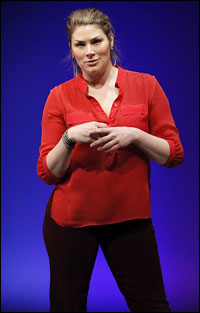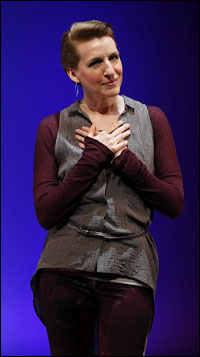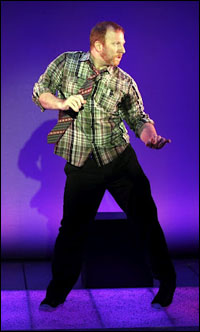
*
'Twas the morning after the night before — that night before being Preview One of Opus Two for the [title of show] gang of four. All of them are busy little B's: Bell, Bowen, Blackwell and Blickenstaff (hereafter referred to Hunter, Jeff, Susan and Heidi). In The Green Room of The Vineyard Theatre, where the stage is still hot from their latest launching, Now. Here. This., the quartet has assembled for notes — basically, a now-hear-this from another B: their director, Michael Berresse.
But first comes their first interview. "We haven't talked about it yet so we're debriefing in front of you," confessed Heidi, stirred if not shaken by that evening's ordeal. "There were things I was surprised that got laughs and moments I thought would kill that got silence, but that's the luxury of having three weeks of previews. I'm sure the show we do tonight will be very different from the show we did last night, and that will continue to happen until we open."
Jeff, who wrote the 15 or so songs in the show, pleaded guilty to déjà vu: "The same challenge happened with [title of show]: the authors are in the show. It's hard to put on your actor hat and go out there when you're trying not to listen to lyrics or how the band's mixing or what the sound designer is doing. That's a huge challenge if you're on stage in a costume singing 'n' dancing."
Susan, who co-authored the book with Hunter, echoed that sentiment: "Last night I was standing backstage, trying not to go too far down the Mariana Trench of saying, 'I think we need to restructure' or 'I think we're going to have to re-examine that.'"
| |
 |
|
| Heidi Blickenstaff | ||
| photo by Carol Rosegg |
The [title of show] band (which previously consisted only of pianist/musical director Larry Pressgrove) has increased by three, and the four-chair "set" has been replaced by Neil Patel's facsimile of a Natural History Museum where the cast wanders, drinking in exhibits that trigger a mind-field of thoughts in freefall.
Clearly, a boldfaced, inquiring reporter is required to excavate what's going on here.
So what is it, exactly? It sounds like it's Son of [title of show].
Hunter: We never considered it a sequel or a prequel. People make associations through the bodies on stage, but, hopefully, the ideas are new for this collaboration.
And they would be . . . ?
Hunter: Okay, we'll practice on you. It's an exploration of stories from our lives. The thrust is: What does it mean to be present in your life? We investigate things from the past, hold them up to the light and see if, by doing so, we can be more in our life.
Now it sounds like therapy.
Hunter: But with a lot of fun songs and dances and jokes. It asks questions that, not just the four of us but perhaps the audience, too, wrestle with: "What does it mean to be quote-unquote happy?" "How do you enjoy your life in this modern world?"
Susan: . . . both the awesome parts of life and the nawesome parts of life.
Nawesome?
Jeff: Nawesome, meaning not awesome.
Did you feel pressure to get something out there again after the success of [title of show]?
Susan: Not pressure, but we did get some good advice from some friends when we were doing [title of show]: "Begin your next project while you're still working on your current project. Plant those seeds for the next project." We've been doing a lot of benefits where we'd put enormous amounts of work into whatever we did — whether it was a piece of storytelling or an original song — and, out of those appearances, we developed a kind of direct-address style of storytelling. It was a very organic sort of real-time development that I thought would be a good next project.
Heidi: There was one event in particular where we developed a piece called "My First Time" for Gypsy of the Year three years ago. It was about Hunter and Susan seeing their very first Broadway show, and Jeff and I kinda supported as a Greek chorus. It was a very satisfying piece to develop, and a lot of people took that ride with us. That, I think, was the very beginning of Now. Here. This. That piece was in the show, but, as Now. Here. This. continued to grow, we let go of it and developed from there. We really enjoyed this storytelling direct-address way of performing.
Throw me some song titles. What's your "Some Enchanted Evening"?
Jeff: There's a song called "This Time" that Heidi sings, Hunter sings a nice song called "Archer" and Susan's got a song called "I Rarely Schedule Nothing."
Susan: There's a beautiful song that Jeff wrote very quickly called "I Wonder." Jeff Bowen is a very interesting composer in that sometimes things take a really long time [and] sometimes 20 minutes — and, either way, they're wonderful. One of the things that's really been neat about this show is that these are pieces of our lives. Jeff will take these and musicalizethem. Mind-blowing!
A little like A Chorus Line, isn't it?
Jeff: It's a similar idea, especially because we are telling stories that are, as we say, "autofictionography." We have somewhat lived through these moments. Then, suddenly, to not just retell the story but to retell it in a song — it's very odd.
Heidi: I have a memory from my childhood we fit into the whole arc of the evening. When I was little, I got tired of being babysat and sabotaged my babysitter's house by pouring chemicals on her kitchen floor. That story has been in my family for years. When time came to do the show, somehow it landed in the play — as a song.
What's it called?
Jeff: "Give Me Your Attention."
Susan: . . . and one of the great ways of getting someone's attention is by pouring chemicals all over their kitchen floor.
Heidi: It certainly got some people's attention.
Hunter: Funny you mentioned the Chorus Line prototype because I was inspired — and I am inspired — by the way that came together: in conversations. There's a specificity and color you get by relaxing your brain and letting those stories come up and using them as fodder for spoken word or inspiration for songs. In that specificity is, hopefully, a universality of something a member of the audience went through, like "Oh, my God! That evokes this memory for me." That's kinda also what it's about. It's about us sharing a lot of our stuff and, perhaps, by the specificity of that, it's universal to an audience.
Heidi: We learned that doing [title of show]. It was a surprise to us, that the more specific and weird we got, the more people felt, "Me-too, me-too, me-too."
| |
 |
|
| Susan Blackwell | ||
| Photo by Carol Rosegg |
Hunter: No. You know what's great, what I love about being here — especially when you're creating new stuff — is that they support your efforts. They're, like, "Go for it. Let's try it." When you're making something new, you need that time to figure it out, and you need that support from every room in the building — not just in the collaboration but from the artistic staff and from the production staff — and they do that here in spades. It makes you feel comfortable so you get to focus on the work and do what you need to do. I'm grateful for it.
Susan: There's a whole team of magical elves that are in the theatre working on light cues and sound cues. While I sleep, their work continues to support this work.
Jeff: The Vineyard has really been great. When we did the two separate runs of [title of show] here, it was like a camp. I feel kinda like I'm back in college.
Can you give me some specific things in the show? Like, are there any showbiz bulletins like Mary Stout getting hit by another hot-dog cart?
Jeff: There's not a lot of theatre-specific things in the show. We sorta ran that gamut with [title of show]. We refer to Thornton Wilder, but there are no Andrew Lloyd Webber jokes.
So you're not actors per se in this?
Susan: We're people. And is that a progression, from actors to people?
Hunter: I think there's Carnies, Actors, People.
Susan: We're making a conscious effort, in the hopes of making it as universal as possible and still remaining specific, of focusing on our experiences as people and not just as performers.
| |
 |
|
| Hunter Bell | ||
| photo by Carol Rosegg |
Hunter: It was everything, so thrilling, so surreal. My metaphor joke is: "We felt like Cinderella at the ball, but Cinderella also worked her ass off a few years, scrubbing to get there." Nobody focused on that part of the story. We were extremely fortunate it all came together. The other side of that is you need bold and brave producers and a theatre owner who'll agree in this commercial climate to take a chance. It was a Mickey-and-Judy story. I have such great gratitude because it changed my life. There's nothing like it — the feel of pride in the completion of that journey, with the show making it to Broadway.
Heidi: I certainly have a new appreciation when I see something on Broadway. Even if I don't love it, I now know how hard it is to get there from the ground up. I've done a handful of Broadway shows, but [title of show] was the one I helped build. It was unbelievable that we made it there. Every day we were so thankful to be there, and that made the experience so satisfying. We never took a second of it for granted. My memories of that time are very clear, very crystallized because we were so grateful.
Jeff: It was such a lesson for all the times, before I was on Broadway, when I thought, "Wow! Those people are lucky." I realized, as we slogged through the mud field on our way to Broadway, everybody slogs through that mud field to get there.
Some even go back for seconds. How long are you at the Vineyard?
Hunter: We're scheduled to run through April 15, with — cross fingers — a possible extension through April, and then I'm sure we'll transfer immediately to Broadway.
(A version of this article appears in the April 2012 edition of Playbill magazine.)










